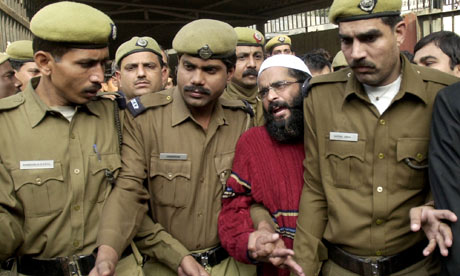by ARUNDHATI ROY
 Indian police bring Afzal Guru to court in Delhi in 2002. PHOTO/Aman Sharma/AP
Indian police bring Afzal Guru to court in Delhi in 2002. PHOTO/Aman Sharma/AP
Spring announced itself in Delhi on Saturday. The sun was out, and the law took its course. Just before breakfast, the government of India secretly hanged Afzal Guru, prime accused in the attack on parliament in December 2001, and interred his body in Delhi’s Tihar jail where he had been in solitary confinement for 12 years. Guru’s wife and son were not informed. “The authorities intimated the family through speed post and registered post,” the home secretary told the press, “the director general of the Jammu and Kashmir [J&K] police has been told to check whether they got it or not”. No big deal, they’re only the family of yet another Kashmiri terrorist.
In a moment of rare unity the Indian nation, or at least its major political parties – Congress, the Bharatiya Janata party and the Communist party of India (Marxist) – came together as one (barring a few squabbles about “delay” and “timing”) to celebrate the triumph of the rule of law. Live broadcasts from TV studios, with their usual cocktail of papal passion and a delicate grip on facts, crowed about the “victory of democracy”. Rightwing Hindu nationalists distributed sweets to celebrate the hanging, and beat up Kashmiris (paying special attention to the girls) who had gathered in Delhi to protest. Even though Guru was dead and gone, the commentators in the studios and the thugs on the streets seemed, like cowards who hunt in packs, to need each other to keep their courage up. Perhaps because, deep inside, themselves they knew they had colluded in doing something terribly wrong.
What are the facts? On 13 December 2001 five armed men drove through the gates of the Indian parliament in a car fitted out with a bomb. When challenged they jumped out of the car and opened fire, killing eight security personnel and a gardener. In the firefight that followed, all five attackers were killed. In one of the many versions of the confessions he was forced to make in police custody, Guru identified the men as Mohammed, Rana, Raja, Hamza and Haider. That’s all we know about them. They don’t even have second names. LK Advani, then home minister in the BJP government, said they “looked like Pakistanis”. (He should know what Pakistanis look like right? Being a Sindhi himself.) Based only on Guru’s custodial confession (which the supreme court subsequently set aside, citing “lapses” and “violations of procedural safeguards”) the government recalled its ambassador from Pakistan and mobilised half a million soldiers on the Pakistan border. There was talk of nuclear war. Foreign embassies issued travel advisories and evacuated their staff from Delhi. The standoff lasted months and cost India thousands of crores – millions of pounds.
The Guardian for more
(Thanks to Aslam Merchant)
